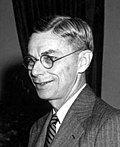Wikipedia:Today's featured article/requests/James Bryant Conant
James Bryant Conant
[edit]This nomination predates the introduction in April 2014 of article-specific subpages for nominations and has been created from the edit history of Wikipedia:Today's featured article/requests.
- This is the archived discussion of the TFAR nomination for the article below. Subsequent comments should be made on the appropriate discussion page (such as Wikipedia talk:Today's featured article/requests).
The result was: scheduled for Wikipedia:Today's featured article/March 26, 2013 by BencherliteTalk 20:11, 15 March 2013
James Bryant Conant (1893–1978) was a chemist, President of Harvard University, and the first U.S. Ambassador to West Germany. As a Harvard professor, he was one of the first to explore the relationship between chemical equilibrium and the reaction rate of chemical processes. He studied the biochemistry of oxyhemoglobin, helped to elucidate the structure of chlorophyll, and contributed insights that underlie modern theories of acid-base chemistry. It was during his presidency of Harvard (1933–53) that women were first admitted to Harvard Medical School and Harvard Law School. As chairman of the National Defense Research Committee during World War II, he oversaw the Manhattan Project, which developed the first atomic bombs. After the war, he served on the Joint Research and Development Board that coordinated defense research, and on the General Advisory Committee of the Atomic Energy Commission. In his later years at Harvard, he taught the history and philosophy of science, and wrote about the scientific method. In 1953 he became the U.S. High Commissioner for Germany, overseeing the restoration of German sovereignty, and then was U.S. Ambassador to West Germany until 1957. (Full article...)
5 points: 2 points as this would be his 120th birthday; 1 point for under-represented subject (chemistry); 2 points for no similar article in six months. The last scientist to appear on the front page was Louis Slotin in May 2012; the last chemist was Joseph Priestley in March 2008. Hawkeye7 (talk) 09:15, 4 February 2013 (UTC)
- Support, high quality article. Great date choice. High encyclopedic value. High educational value. Also, SCIENCE! — Cirt (talk) 05:47, 17 February 2013 (UTC)
- The reader can learn a great deal about chemistry from clicking on the links in the chemistry section. The advanced reader might pore over the original papers, which we provided links to. User:EdChem (talk) provided a great deal of input into the Chemistry section. Hawkeye7 (talk) 05:09, 18 February 2013 (UTC)
- Points look good. Trimmed to fit the 1,200 character blurb limit. BencherliteTalk 23:46, 17 February 2013 (UTC)
Support science, per Cirt, --Gerda Arendt (talk) 21:42, 18 February 2013 (UTC)
- Conditional Support. I counted four "red" links in the article. I feel that when we are showing our best work, we should always give our readers the chance to learn more. So long as the links can lead to further information, even if it's just a couple of lines extra, we're good to go. We need an expert to add four (probably very brief) articles to complete the links. Otherwise, the article is well-written, and with no other recent chemists this would certainly be a welcome science-related featured article. RomanSpa (talk) 15:35, 20 February 2013 (UTC)
- Strongly disagree regarding redlinks. No editor should be responsible for eliminating redlinks at any level. I've had to do it for some of my hooks at DYK and didn't much like it as I could only create a shitty stub or two because I had no relevant sources to hand.--Sturmvogel 66 (talk) 15:44, 20 February 2013 (UTC)
- (edit conflict)Back-from-the-dead support purely to cancel out the above. I have no opinion on this article as what I know about 1950s Germany could be written on a stamp, but "oppose, contains redlinks" is probably the second-stupidest comment I've ever seen in six years of TFAR. (It's saved from the #1 slot only by virtue of "we need to add four probably very brief articles to complete the links", which would be a direct violation of WP:REDDEAL, and if anyone were to try it would at the very least earn them a stern warning and probably get them hauled off to ANI for disruption.) – iridescent 15:53, 20 February 2013 (UTC)
- While you were adding your helpful comments, I've made a start on an article on Wallace Akers, which removes one of the "red" links. I hope this is of some use. RomanSpa (talk) 16:08, 20 February 2013 (UTC)
- For what it's worth, I was only expressing a personal view. The comments in WP:REDDEAL don't seem to me to specifically relate to featured articles, and my own view is that with a featured article we do better to show ourselves to be as comprehensive as possible. RomanSpa (talk) 16:12, 20 February 2013 (UTC)
- It's also very hard for me to understand why adding an extra article to Wikipedia in good faith, to try to improve our coverage of an interesting area, could reasonably be described as disruptive. And now I'd better get back and add a references section to Wallace Akers. RomanSpa (talk) 16:16, 20 February 2013 (UTC)

